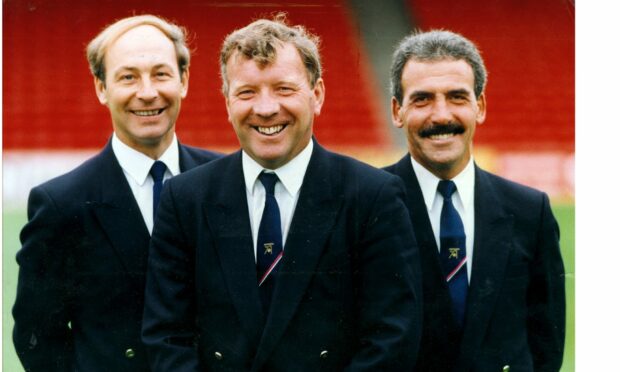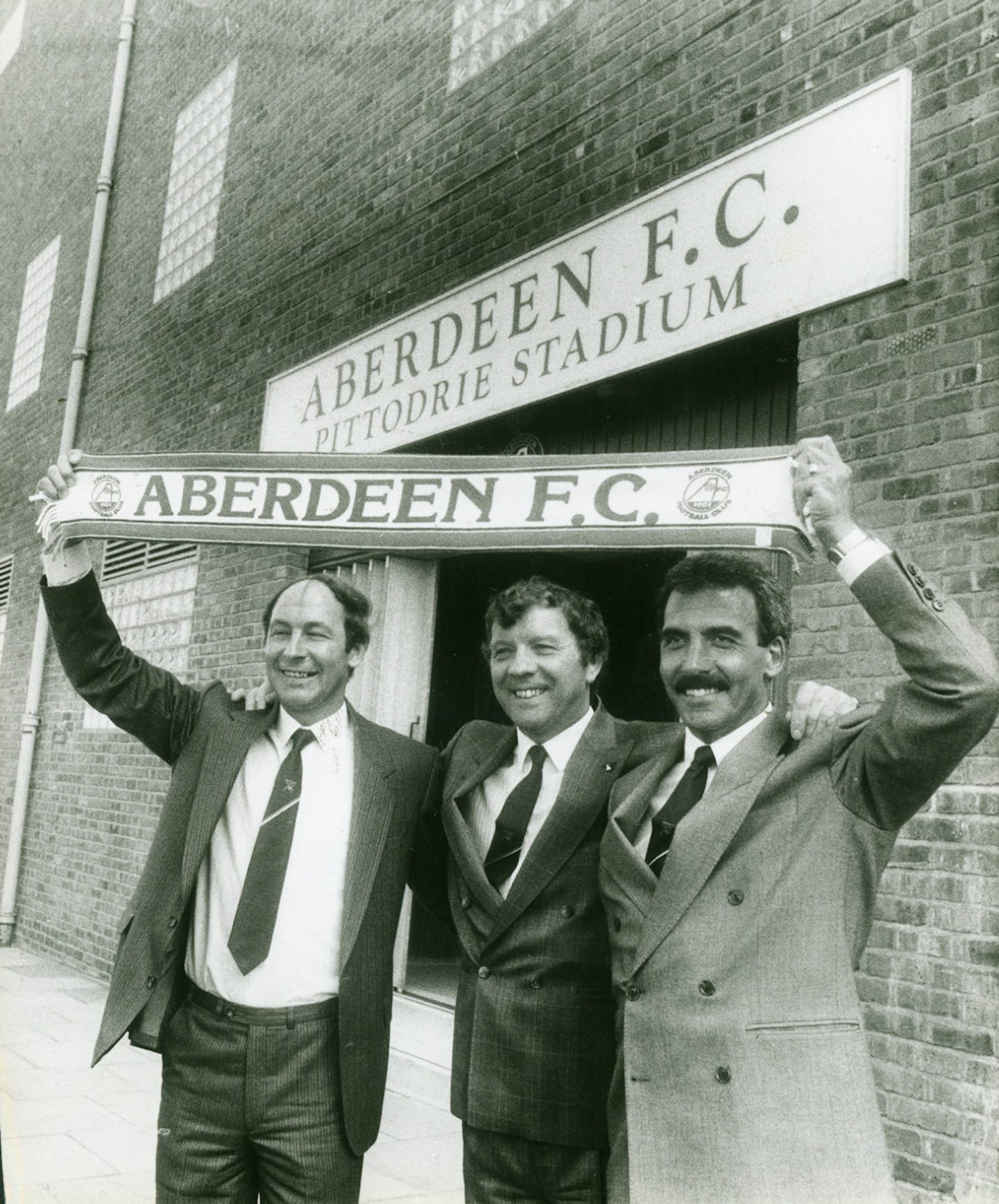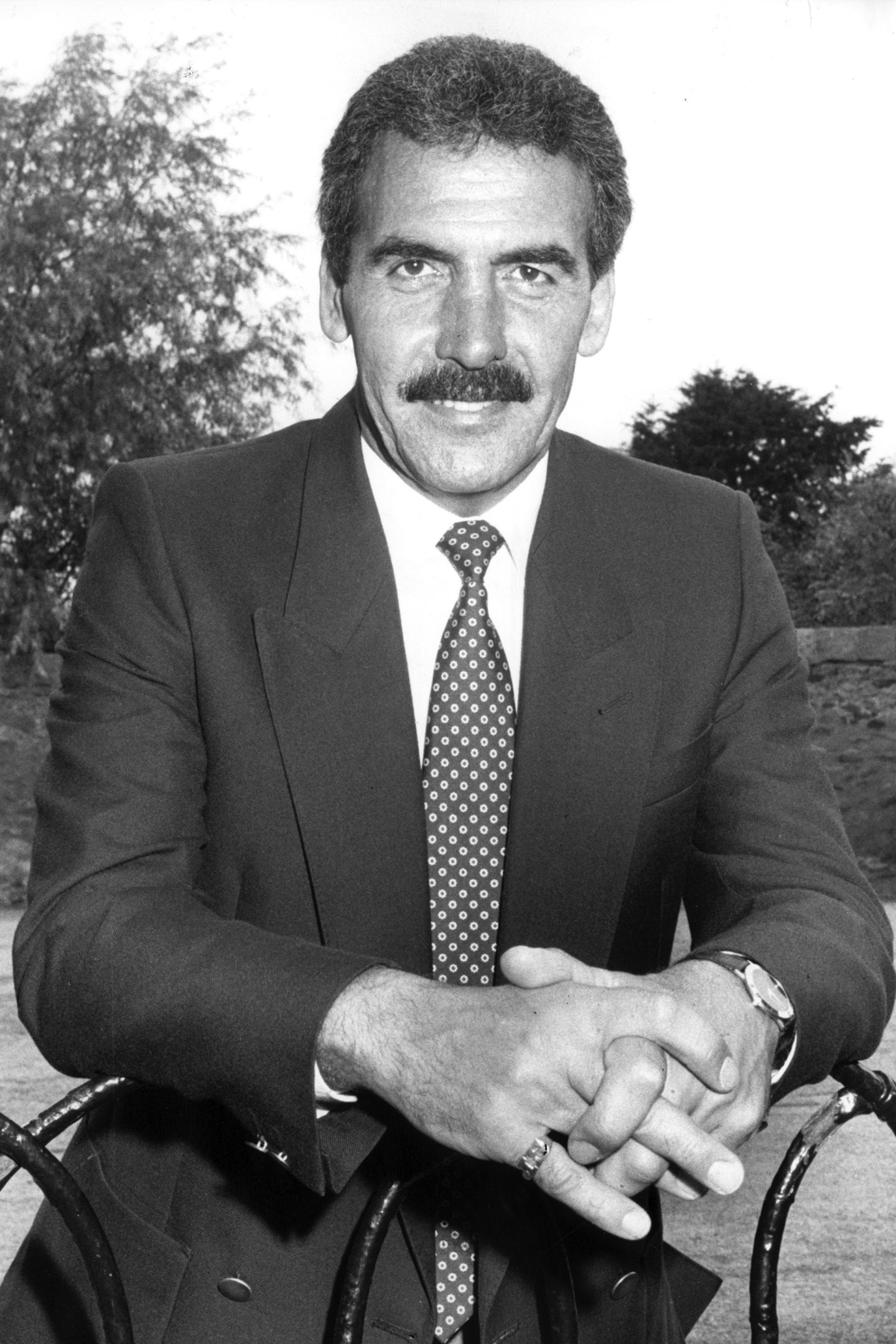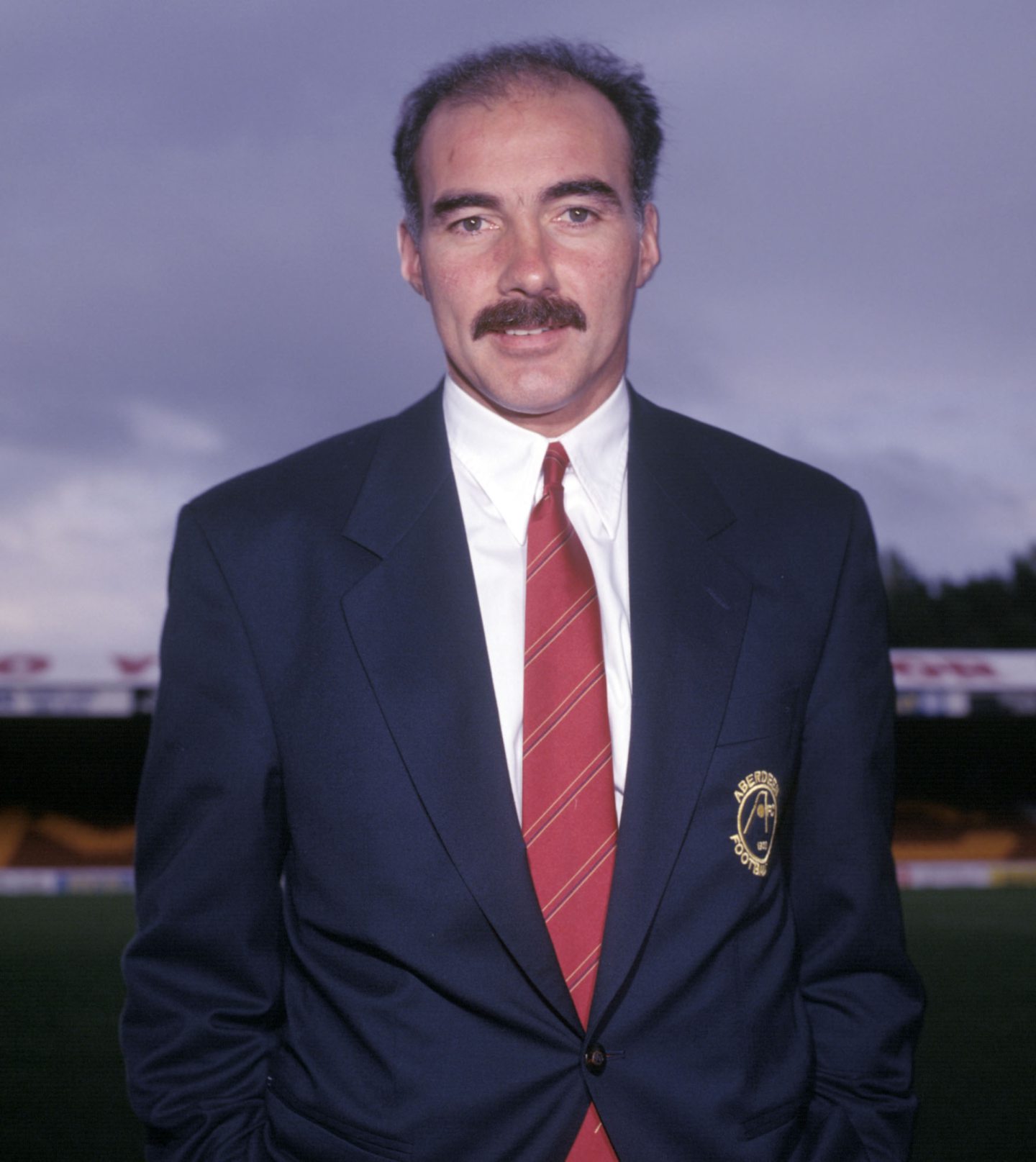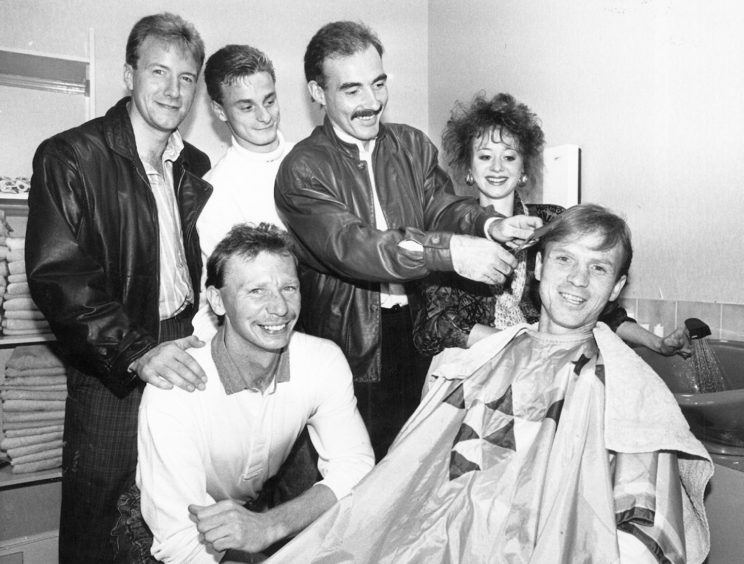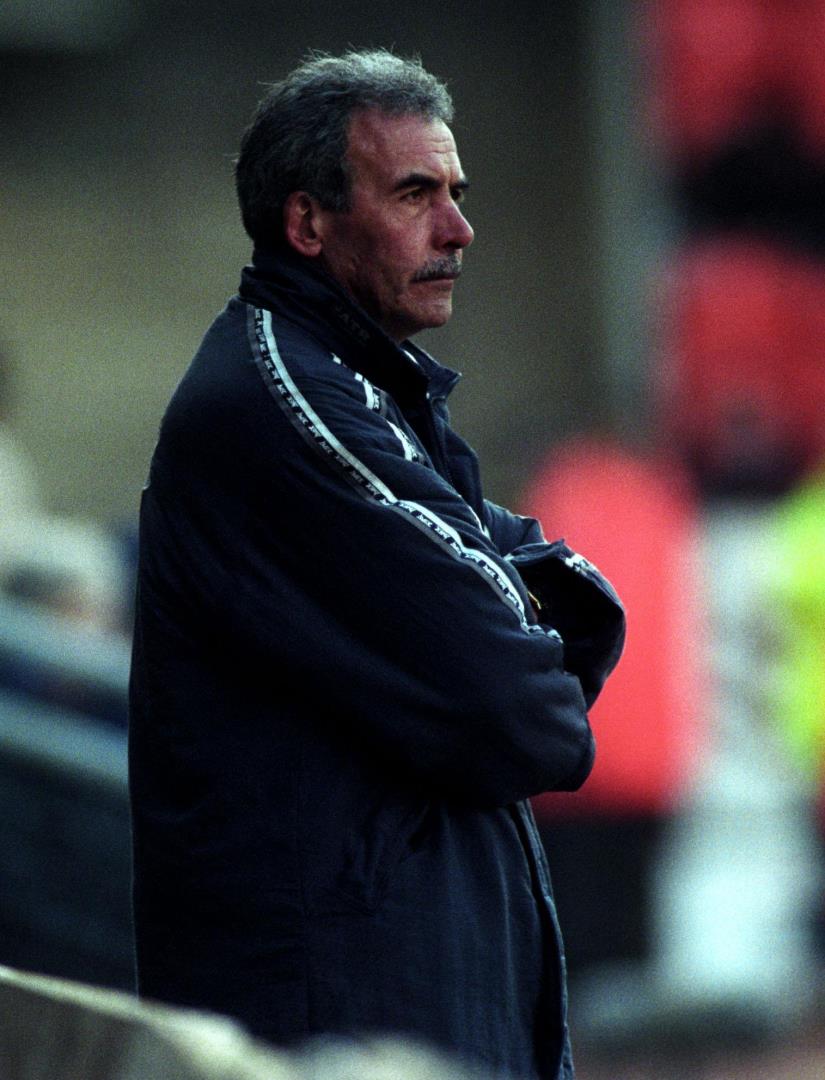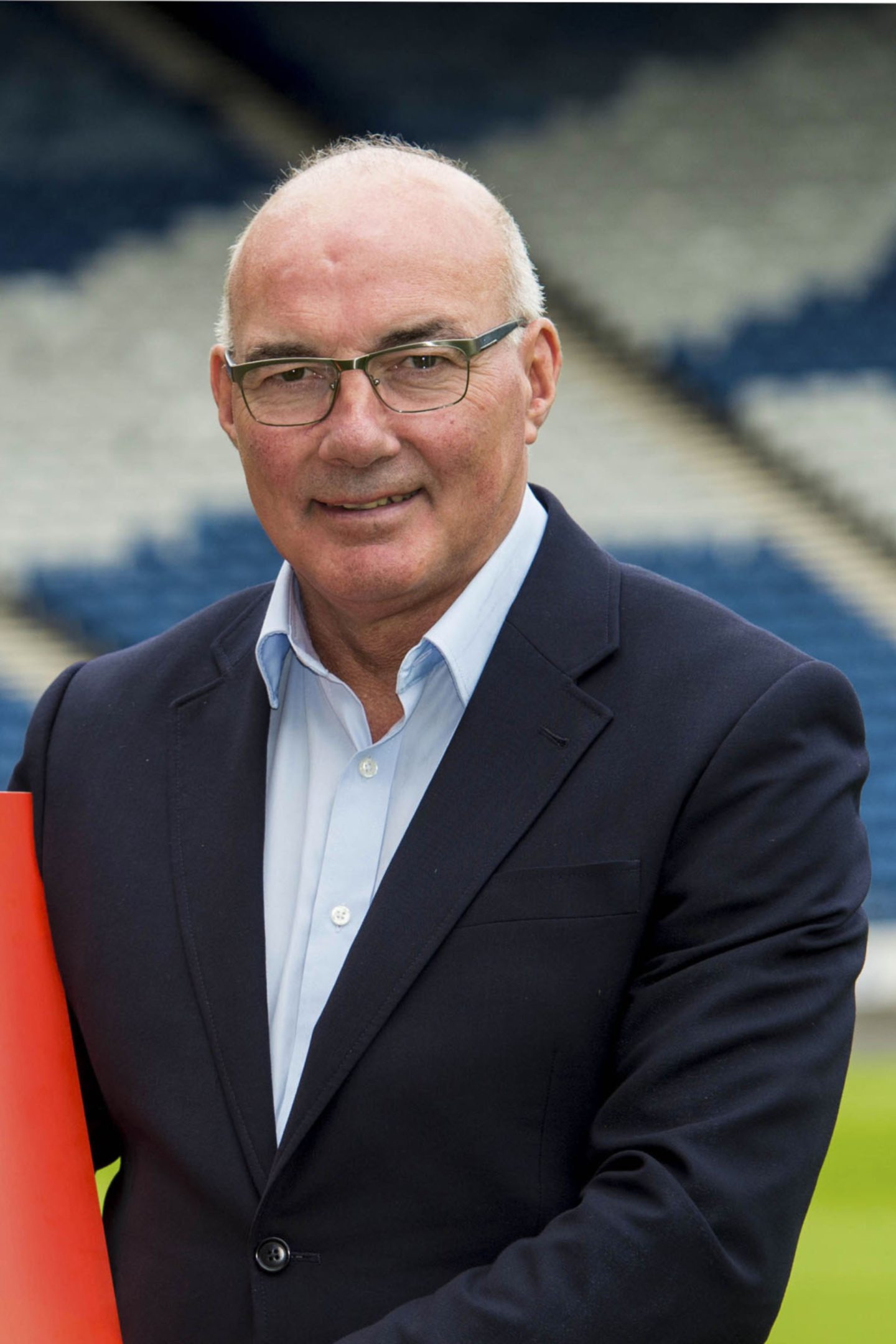It was never going to be an easy job to replace Alex Ferguson when he left Aberdeen to join Manchester United in 1986.
But there was no immediate signs of a slump in the Dons’ fortunes as they mounted a strong bid for the Scottish championship in the 1990-91 campaign.
Alex Smith was the man at the helm of the Pittodrie club’s challenge, which went all the way to the last game of the season when they were beaten 2-0 by Rangers at Ibrox.
It was an outcome that allowed the hosts to claim the title by two points from their north-east rivals, who, despite their disappointment at the climax, still finished 12 points clear of third-placed Celtic.
That should have been the springboard for a sustained resurgence and Smith, a beetle-browed, bustling little coil of energy, worked effectively with Jocky Scott and Drew Jarvie, as the team prepared for new battles 30 years ago.
There’s a photograph of them standing outside Pittodrie with beaming smiles on their faces and it really looks as though they were the Three Amigos.
But their critics, who regarded them more as the Three Stooges, were ready to pounce – and there was plenty of trouble and strife in the months ahead.
It’s amazing, when one looks back on the resources at their disposal, that Aberdeen came close to being relegated during a hapless period in the winter gloom which yielded only three victories in 17 matches.
None of this happened on Scott’s watch – he left to take charge of Dunfermline Athletic in September 1991 – but the squad was packed with quality and Smith seemed to have recruited well with the signing of such talented individuals as Theo Snelders, Paul Mason and Hans Gillhaus to reinforce young stars including Eoin Jess, Stephen Wright, Scott Booth and Michael Watt.
Nobody could have have predicted the dramatic fall from grace that occurred in the sporting equivalent of a blink of an eye.
But Smith saw some early warning signs when his personnel crashed out of the Uefa Cup and the angry response from many supporters testified to their frustration.
He recalled: “The trouble began at Pittodrie in September when we played BK Copenhagen and the night didn’t go well for us (they lost 1-0).
“I had appointed Willie Miller as coach and had the idea that I would manage for a few years until Willie was ready for the job.
“Alternatively, he could have gone to another club before returning to Pittodrie.”
I thought Alex’s sacking was an injustice, but the fact is that football can be an unjust business.”
Willie Miller
“But Willie was in the dug-out that night when Copenhagen scored with just four minutes to go and, suddenly, I heard a single voice in the stand shouting: ‘There’s only one Willie Miller’.
“And then the crowd took up another chant. It became: ‘Smith must go.”
With the Dons also losing 2-0 in the second leg, it became a familiar refrain.
And yet, some of those supporters who were vocal in their condemnation later admitted they had mixed feelings about the derision that rained down on Smith: a likeable, down-to-earth character who never offered less than maximum effort wherever he travelled on his peripatetic career.
Jock Gardiner, a member of the AFC Heritage Trust, summed up the cocktail of emotions that will probably strike a chord with many Dons aficionados.
‘I later apologised to Alex’
He said: “The season started well in the league but three home defeats – to Airdrie in the League Cup, St Johnstone in the league and BK Copenhagen in the Uefa Cup – had many of the Aberdeen fans baying for Smithy’s blood.
“There was a large crowd of supporters who assembled outside the main stand, shouting for his head at the end of the insipid 1-0 reverse to the Danish side.
“That was the beginning of the end and, as autumn moved into winter, the form deteriorated and Alex Smith was finally sacked in February 1992.
“At the time, I was one of those fans who wanted him to go, as the demand for Willie Miller to take on the job of restoring the Dons to the upper reaches of the league had reached fever pitch.
“But, with hindsight, it could be argued that Smith should have been given longer to turn things around and I recall having a conversation with him at the local Referees Association dinner in Aberdeen a couple of years after he left Pittodrie, when he was the guest speaker.
“I actually apologised to him for being part of the crowd who had shouted for his removal and he graciously accepted my apology.”
With Scott gone and Jarvie reduced to a place on the periphery, Smith was left in No Man’s Land as the club were knocked out of the Scottish Cup in the third round by Rangers, while their misery piled up on the league trail.
In November and December, they were beaten in consecutive fixtures by Dundee United, Celtic, Hearts and Hibs – and mustered only one goal in these contests, from Jess – and a 4-0 away thrashing at Tannadice on New Year’s Day left the away supporters wishing Smith everything but the compliments of the season.
The pressure was becoming all-pervasive and he knew it.
Yet, as he told Aberdeen’s official biographer, Jack Webster, he had intended bringing Alex McLeish into the management team and reviving the famous Miller-McLeish partnership, which might have proved a masterstroke.
However, he was not granted the time and Webster wrote: “Fan power was on the rampage.
“By the end of the year, allowing nothing for a mounting injury list, the chants were augmented by placards, spelling out the message.
“The Pittodrie board more or less bowed to the pressure, glad to get the fans off their back, and appointed the most important player in the entire history of the club.
And so, Willie Miller took residency of the hot seat in February.”
It was a sobering experience for Smith, but he had been involved in the sport long enough to realise that it’s a results-driven business.
Sentiment counts for little when the wheels are falling off.
Miller, for his part, was just 36 when he picked up the torch and he had his own misgivings about the fashion of his appointment, after Smith had become the first Dons manager ever to be dismissed from the role.
‘Injustices happen in this game’
He said: “Before he was sacked, Alex asked me to become coach of the first team. Then he was gone and I was called in to be offered the job.
“Of course, you have doubts in a situation like that, but it was a challenge which I simply could not turn down.
“I thought Alex’s sacking was an injustice, but the fact is that football can be an unjust business.”
If nothing else, Miller’s appointment towards the end of February steadied the ship and his men gained a 0-0 draw on his managerial debut at Ibrox.
He couldn’t implement an overnight transformation, but improved Aberdeen’s defensive displays and gradually orchestrated a revival, with the Dons picking up four wins and five draws in their last dozen matches.
That was scarcely a record to brag about and the 2-0 defeat to champions Rangers on the last day of the season (for the second year in a row) meant that, for the first time in 15 years, Pittodrie would be denied European action.
So what was the lesson of all this turmoil and turbulence?
From Smith’s perspective, he was convinced the club possessed sufficient talent to be vying for honours, not scrabbling desperately to finish sixth.
And, as Webster wrote in the centenary Dons biography in 2003: “You could see his point when you scanned the names: Theo Snelders, Alex McLeish, Jim Bett, Stewart McKimmie, Mixu Paatelainen, Hans Gillhaus, Robert Connor, Paul Mason, David Robertson, Eoin Jess, Scott Booth and others.”
None of which prevented him from being ushered out the exit door, less than a year after he nearly brought the championship trophy back to Pittodrie.
And yet, and yet, the question still remains: Was it Miller’s time to shine?
After all, as Jock Gardiner pointed out: “Willie Miller did revitalise the Dons with a strong season in 1992-3 when the club finished second to Rangers in all competitions… so again, with double hindsight, the rhetorical question that could be asked is “Was the sacking of Alex Smith not the correct decision ?”
“In terms of Miller’s own managerial career, the perceived wisdom around the time of his appointment centred on whether it would have been better for him to have learned his trade at a smaller club before taking on the Aberdeen role.
“We will never know the answer to that question.
“At this stage, 30 years on, I believe that all of the protagonists, Alex Smith, Jocky Scott, Drew Jarvie and Willie Miller will be remembered by Aberdeen fans in the ‘good guys’ category.”
The same might be true of Stephen Glass, who is facing thorny questions of his own at the moment.
Sadly, good guys don’t always get their just desserts in this game.
